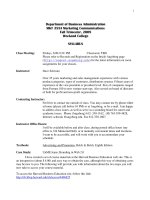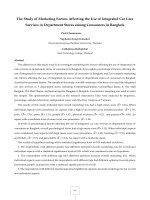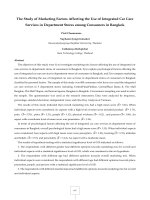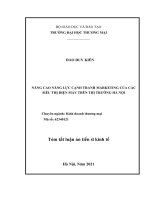MARKETING DEPARTMENT
Bạn đang xem bản rút gọn của tài liệu. Xem và tải ngay bản đầy đủ của tài liệu tại đây (13.69 KB, 4 trang )
Individual Assignment [HOM202]
Nowadays, individuals live in a very dynamic world that requires constant changes, and
humans, too, have very dynamic behaviour (Duggal, 2021). To understand their behaviour, every
business organization needs a strong marketing team to accomplish the company's mission (Norris,
2021). As the head of the Marketing department, the main trend that should be suggested to carry out
on the firm would be to use artificial intelligence to understand consumer behaviour patterns and also
utilize data to convert potential customers (Hall, 2021). Furthermore, the Marketing department will
take up sustainable marketing practices that would ensure recycling, reuse, and reduce and smartly
address the waste problem (Ramyalg, 2022).
Overall, the purpose of this paper will propose the trend of utilizing artificial intelligence and
create a sustainable development plan in order to enhance the growth of the organization.
Currently, the company follows traditional marketing practices that have become obsolete
according to the modern market, and to compete in this competitive market; it is necessary to adopt
updated marketing practices (Karlson, 2021). Marketers may use artificial intelligence (AI) to uncover
and anticipate future trends (Verma et al., 2021). In light of this knowledge, they may make decisions
about how to allocate their finances and whom to target. As a result, brands may be able to save
money as well as time on poor digital advertising and transfer their resources to other valuable
initiatives. Businesses may also benefit from artificial intelligence in order to generate better and more
focused marketing (Sterne, 2020). By implementing AI into the core of the agency's digital marketing
strategy, it may increase sales while also saving money. The use of artificial intelligence has the
potential to improve sustainability, scalability, and global trends on a larger scale (Zhang, 2021).
Chief Marketing Offices are becoming increasingly reliant on technology, while according to
a study conducted by the American Marketing Association in August 2019, the use of artificial
intelligence has climbed by 27 per cent over the previous year (Zhang, 2021). A Deloitte (2020)
worldwide research of early AI adopters found that three of the top five AI objectives are marketingrelated in increasing the value of existing goods and services, generating new products and services,
and building customer relationships (Verma et al., 2021).
In a company, marketing is the department that stands to gain the most from the
implementation of AI (White, 2021). The primary duties of marketing are to detect customer
requirements, match those requirements to products and services, and convince people to purchase—
abilities that AI has the potential to enhance dramatically (Pati, 2021). It's no surprise that marketing,
according to a 2018 McKinsey analysis of more than 400 advanced use cases, would be the industry
where artificial intelligence will provide the greatest value (Verma et al., 2021). There are numerous
businesses that use AI for a variety of tasks, including digital ad placement, which is also known as
programmatic buying, to assist with broad tasks, such as improving the accuracy of predictions as
thinking sales forecasts, and to supplement human efforts in structured tasks, such as customer service
(Arsene, 2021).
Despite several advantages of marketing by implementing AI, it also contains several
disadvantages. The significant impediment would be that artificial intelligence requires training which
could be costly (Arsene, 2021). Furthermore, one of the most serious shortcomings of artificial
intelligence is that it cannot be trained to think creatively (Lemco, 2020). Even while artificial
intelligence is capable of learning over time by utilizing pre-fed knowledge and past experiences, it is
unable of adopting a creative approach to problem-solving (Chen, 2021). In the case of the Quillbot,
which is capable of authoring Forbes earnings reports, this is a well-known example (Huang & Rust,
2020). Data and information that was previously supplied to the bot are contained alone inside these
reports (Borodescu, 2020). The fact that a bot can write an essay on its own is impressive;
nonetheless, this piece lacks the human touch that other Forbes articles have. Humans are being
increasingly displaced from a range of repetitive occupations by artificial intelligence, which is
perhaps one of the most severe drawbacks of artificial intelligence so far (Zhang, 2021). The
reduction in the need for human intervention has resulted in the elimination of a number of
professional opportunities. Simple examples include the use of chatbots, which may provide
enormous benefits to firms while being a nightmare for employees (Sterne, 2020). According to
McKinsey & Company, artificial intelligence will replace at least 30% of human labour by 2030, and
maybe more (Arsene, 2021).
Sustainable marketing practices will be considered as a sustainable development plan for
which would ensure recycling, reuse and reduce and smartly address to waste problem, such as the
purpose of our marketing would be broader and not just earning profits (Borodescu, 2020). In the
marketing world, sustainable marketing refers to the promotion of ecologically and socially
responsible products, processes, and brand values, among other things (White, 2021). Less use of
traditional marketing practices such as hoardings requires huge investments and also wastes resources
instead of using social media platforms which are comparatively cheaper (Lemco, 2020). Moreover,
making advertisements that are consumer-oriented as the client is the king of the market (Huang &
Rust, 2020).
There are various advantages and disadvantages of the sustainable development plan.
Advantages areas it would be less costly and more efficient also it will help in getting almost accurate
results (Zhang, 2021). Sustainable marketing practices also requires very less maintenance as it needs
very less infrastructure and design. It will encourage reduction, reuse and recycle policy (Borodescu,
2020). The major disadvantage could lead to conflicting interests as every organization have the
motive of profit maximization; therefore, it could deviate interest (Dayan, 2021).
To sum up, as head of the Marketing department , AI will be introduced as new techniques
that will help in overall development and growth of the company and also ensure corporate social
responsibility that every organisation should have towards society—majorly focusing on long term
goals of the company while creating revenue (Borodescu, 2020).
References
Arsene, C. (2021, November 24). How artificial intelligence is shaping modern marketing. Digital
Authority Partners. Retrieved February 21, 2022.
Borodescu, C. (2020, July 28). Artificial Intelligence in marketing - what do they have in common?
MorphL AI Blog. Retrieved February 21, 2022.
Chen, H. (2021, March 7). Ai Marketing: New technology to maximize business results. Keenfolks.
Retrieved February 21, 2022.
Dayan, A. (2021, December 9). 4 practical ways to use AI in marketing (& why you need it):
[site:name]. WordStream. Retrieved February 21, 2022.
Duggal, N. (2021, December 20). Top advantages and disadvantages of Artificial Intelligence [2022
edition]. Simplilearn.com. Retrieved February 21, 2022.
Hall, J. (2021, December 10). Council post: How artificial intelligence is Transforming Digital
Marketing. Forbes. Retrieved February 21, 2022.
Huang, M.-H., & Rust, R. T. (2020). A strategic framework for artificial intelligence in marketing.
Journal of the Academy of Marketing Science, 49(1), 30–50.
Karlson, K. (2021). 8 ways intelligent marketers use artificial intelligence. Content Marketing
Institute. Retrieved February 21, 2022.
Kumar, S. (2019, December 12). Advantages and disadvantages of Artificial Intelligence. Medium.
Retrieved February 21, 2022.
Lemco, A. (2020). Artificial Intelligence - Journal - Elsevier. Journal. Retrieved February 21, 2022.
Norris, P. (2021, November 18). 10 impressive examples of AI in marketing. Social Media Strategies
Summit Blog. Retrieved February 21, 2022.
Pati, S. (2021, August 4). Advantages and disadvantages of using artificial intelligence. Artificial
Intelligence, Big Data Analytics and Insight. Retrieved February 21, 2022.
Ramyalg, J. (2022, February 7). Artificial Intelligence in Marketing: Boost the growth in 2022.
MobiDev. Retrieved February 21, 2022.
Sterne, J. (2020, June 8). Introduction to artificial intelligence for marketing. Stukent. Retrieved
February 21, 2022.
Verma, S., Sharma, R., Deb, S., & Maitra, D. (2021). Artificial Intelligence in Marketing: Systematic
Review and future research direction. International Journal of Information Management Data
Insights, 1(1), 100002.
White, C. (2021, November 2). How AI is changing the future of Digital Marketing (2021).
Bramework. Retrieved February 21, 2022.
Zhang, Y. (2021, March 18). Artificial Intelligence in Marketing: History, definition, types, examples
and benefits. Hapticmedia. Retrieved February 21, 2022.









